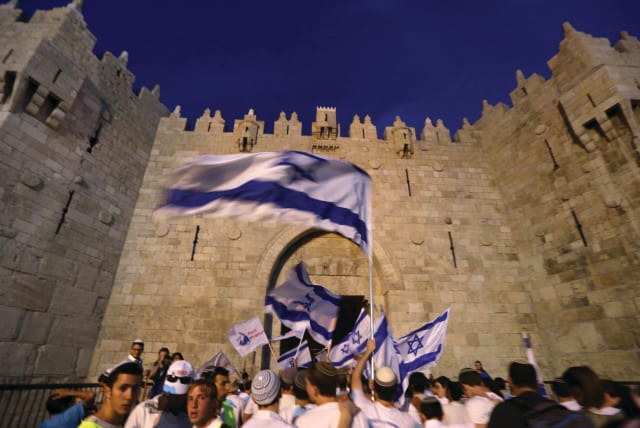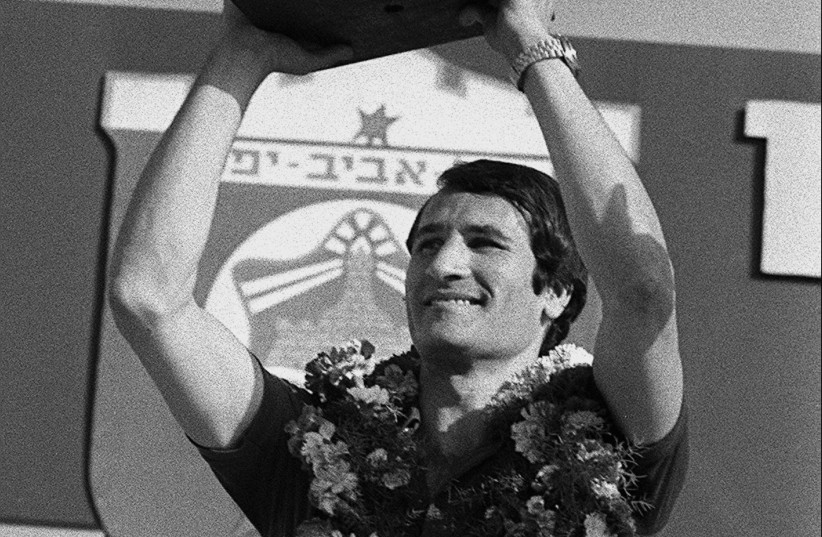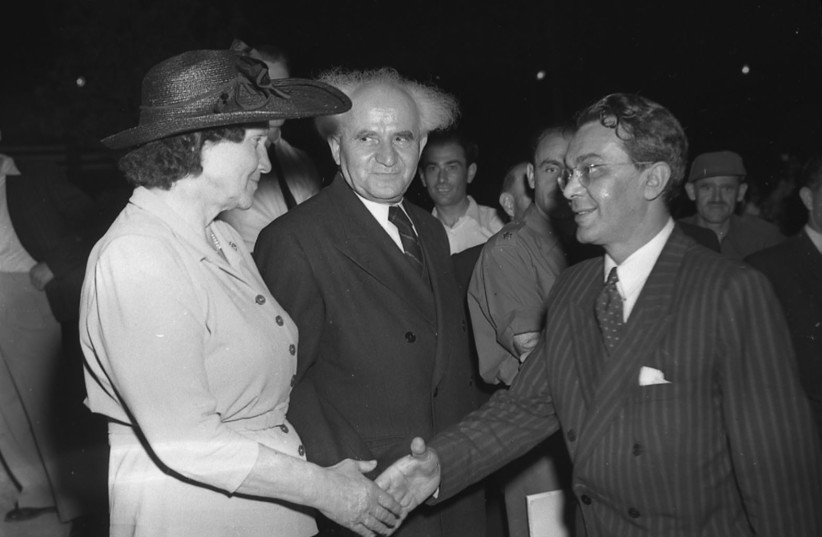A Zionist Omer: Significant days in Israeli history

A proposal for a Zionist counting of the Omer, a purposeful reflection on the significance of just a few of the anniversaries, commemorations, and celebrations in the weeks ahead.
We’re out of Egypt, but the true significance of the Exodus is yet to be revealed. The metaphorical seven-week journey to Mount Sinai has just begun, and it is only there that we will coalesce as a people, receive the Torah, and begin to understand the responsibility we’ve taken upon ourselves by accepting it. On our way, we’ve begun enumerating the 49 days of the Omer – counting up, not down, with ever-growing anticipation as we prepare ourselves spiritually for this most momentous occasion, recognizing that our liberation from bondage was only a first step toward considering the meaning with which we wish to infuse our lives, now that the freedom of choice is ours.
No less so the choice as to the sort of Jewish state we wish to fashion, given that – collectively speaking – that choice is also ours to make. A proposal, then, for a Zionist counting of the Omer, a purposeful reflection on the significance of just a few of the anniversaries, commemorations, and celebrations in the weeks ahead as a troubled Israel, at odds with itself, turns 75.
(Note: The 2023 Gregorian dates below correspond to the Hebrew calendar.)
April 8 – Maccabi Tel Aviv wins the European Basketball Championship (1977)
“We are on the map! And we are staying on the map – not only in sports, but in everything.” – Tal Brody, captain of Maccabi Tel Aviv, on winning the European basketball championship after defeating CSKA Moscow.
Brody’s spontaneous expression of national pride engendered a collective sense of self-esteem and a feeling of having achieved a state of permanency on the world stage that has sustained us for decades. A day, then, to consider where we are on that stage today, how we got there, and if that’s where we want to be.
April 11 – The founding of Tel Aviv (1909)
“Tel Aviv has become one of the hottest travel destinations on the planet, with rave reviews from travel magazines and TV pundits… ‘Best for Style,’ ‘Best Urban Beaches,’ ‘Best LGBTQ Destination,’ ‘Best Foodie Scene’ and ‘Best Nightlife’... in many ways, the ultimate Mediterranean vacation hotspot… sparkling beaches, nearly yearlong sunshine… and a seriously laid-back vibe.” – Frommer’s Travel Guide to Israel
It was back in 1909 that 66 families gathered on a barren sand dune to allocate among themselves parcels of land that would become Tel Aviv, the first Jewish city since the destruction of the Second Temple. With its name borrowed from the Hebrew translation of Theodor Herzl’s utopian novel, Old-New Land, one can only wonder if Israel’s founding father and the pioneers he inspired would consider the White City that has evolved from their dreams to be a fitting tribute to 2000 years of longing.
April 16 – Eichmann Trial (1961)
“When I stand before you, judges of Israel… I am not standing alone. With me are six million accusers. But they cannot rise to their feet and point an accusing finger toward him who sits in the dock and cry: ‘I accuse.’ For their ashes are piled up on the hills of Auschwitz and the fields of Treblinka, and are strewn in the forests of Poland… Their blood cries out, but their voice is not heard.” – Attorney-general Gideon Hausner, in his opening speech at the trial of Adolf Eichmann
How devastating that even in Israel, comparisons are being made between Hitler’s democratic takeover of Germany and the judicial reforms being advanced by the government. Can there be any forbearance for drawing parallels between what we are experiencing today and the rise of Nazism?
April 18 – Holocaust Remembrance Day
“What happened exceeded our boldest dreams. The Germans ran twice from the ghetto… I feel that great things are happening, and what we dared to do is of great, enormous importance.” – Mordechai Anielewicz, commander of the Jewish Fighting Organization, from his last letter penned during the Warsaw ghetto uprising, 21 April 1943
To mark 80 years since the Warsaw Ghetto Uprising, Yad Vashem has set this year’s theme for its special activities as “Jewish Resistance during the Holocaust.” That Holocaust Remembrance Day is commemorated in proximity to Remembrance Day for the Fallen of Israel’s Wars and Independence Day, gives the topic particular significance as we contemplate the wonder of transition from near annihilation to national rebirth.
No doubt our varying world views and conflicting perspectives on the challenges facing Israel today are attributable in part to the meanings we extract from the most horrific atrocity endured by our people on the one hand, and the regeneration of the Jewish commonwealth on the other.
April 2 – Yahrzeit of Rachel Bluwstein (1890-1931)
“Perhaps it was never so / Perhaps / I never woke early and went to the fields / To labor in the sweat of my brow /
“Nor in the long blazing days / Of harvest / On top of the wagon laden with sheaves, / Made my voice ring with song /
“Nor bathed myself clean in the calm / Blue water / Of my Kinneret. O, my Kinneret, / Were you real or did I dream a dream?” – Rachel, matriarch of Israeli poetry, whose short life of simple aspirations and bittersweet longings thwarted by illness and circumstance, bids us all to reflect on our dreams
April 25 – Remembrance Day for the Fallen of Israel’s Wars
“Our sons and daughters, who fell in defense of our state, fought together and fell together. They did not ask, nor did anyone ask them, who was right-wing and who was left-wing. Who was religious. Who was secular. Who was Jewish and who was not Jewish. They fell as Israelis, defending Israel.
“In cemeteries, arguments fall silent. A silence that demands that we fulfill, together, their single dying wish: the resurrection of Israel. United, consolidated, responsible for each other. For we are all sisters and brothers.” – President Isaac Herzog, at the opening of Remembrance Day for the Fallen of Israel’s Wars, 2022
April 26 – Independence Day
“That there are differences among us is nothing new, nor should that, in and of itself, alarm us. The question is whether we can bear different opinions, just as we bear different faces.
“It would be illusionary to think that the day will come when we will all share the same political position. So the question is not whether there will be disagreements between us, but how we will conduct ourselves in resolving them.” – Yitzhak Navon, fifth president of Israel, addressing the nation on Independence Day, 1983, at the height of the controversy over the war in Lebanon
May 1 – Birthday of Theodor Herzl (1864-1904)
“I truly believe that even after we possess our land, Zionism will not cease to be an ideal. For Zionism, as I understand it, includes not only the yearning for a plot of the Promised Land legally acquired for our weary people, but also the yearning for moral and spiritual fulfillment.” – Theodor Herzl, from one of his last essays, published in Hatikvah, a journal of European Zionist youth, bequeathing them his ethical will
May 7 – Yahrzeit of Avraham Shlonsky, 1967 recipient of the Israel Prize for Literature
“Clothe me, goodly mother, in a glorious coat of many colors / And with dawn lead me to toil / My land wraps itself in light as in a tallit / Houses stand out like tefillin / And like tefillin straps, the palm-paved highways glide downward” – Avraham Shlonsky, from his 1928 poem, “Toil,” reflecting the transfiguration of religious imagery to suit the Third Aliyah pioneering ethic, an early contribution to the ongoing discourse as to what it means for Israel to be a Jewish state
May 9 – Lag Ba’omer
“Love your neighbor as yourself. This is a great principle of the Torah.” – Rabbi Akiva
Talmudic lore has it that during the omer, thousands of Rabbi Akiva’s students succumbed to a terrible plague. The reason for the calamity? Acrimony among the students who disagreed with one another. Lag Ba’omer is celebrated as the day on which the dying ceased – the result, perhaps, of his remaining disciples learning to resolve their differences civilly?
May 19 – Jerusalem Day
“Why is Yerushalayim always two, the celestial and the earthly / And I want to live in / Yerushalayim the middle / Without hitting my head up above and without stubbing my foot down below / And why is Yerushalayim in the language of pairs like hands and feet / I want to live in only one Yerushal / Because I am only one and not two.” – Yehuda Amichai, poet laureate of Israel. A day to celebrate a city united, while also wrestling with its manifold persistent divisions.
May 26 – Shavuot
“On the third day, as morning dawned, there was thunder, and lightning, and a dense cloud upon the mountain, and a very loud blast of the horn; and all the people who were in the camp shuddered.” – Exodus 19:16, from the Torah reading for Shavuot, describing the prelude to revelation
A classic midrash (Tanchuma, Nitzavim 3:1) explains that the entirety of the Jewish people stood at Mount Sinai – those who departed Egypt, those born since, those yet to be born. It was a phenomenon we experienced together, a moment of awe and trembling, and of profound understanding that we shared a common destiny and bore a collective responsibility to be worthy of the designation thrust upon us at the time: “To be a kingdom of priests and a holy nation.”
THE 49 DAYS of the Omer, 2023: a challenge to recapture the sense of unity and purpose experienced at Mount Sinai, a call to consider anew the direction our journey has taken since leaving Egypt and entering the Promised Land – and an opportunity to reinvigorate the Zionist enterprise with the teachings of our sages, the vision of our prophets, and the dreams of our founding fathers and mothers. ■
The writer is currently engaged in establishing the Yitzhak Navon Center for a Shared Society. He previously served as deputy chair of the Jewish Agency and the World Zionist Organization, and was the founding director of the Herzl Museum and Educational Center. breakstonedavid@gmail.com
Jerusalem Post Store
`; document.getElementById("linkPremium").innerHTML = cont; var divWithLink = document.getElementById("premium-link"); if (divWithLink !== null && divWithLink !== 'undefined') { divWithLink.style.border = "solid 1px #cb0f3e"; divWithLink.style.textAlign = "center"; divWithLink.style.marginBottom = "15px"; divWithLink.style.marginTop = "15px"; divWithLink.style.width = "100%"; divWithLink.style.backgroundColor = "#122952"; divWithLink.style.color = "#ffffff"; divWithLink.style.lineHeight = "1.5"; } } (function (v, i) { });


